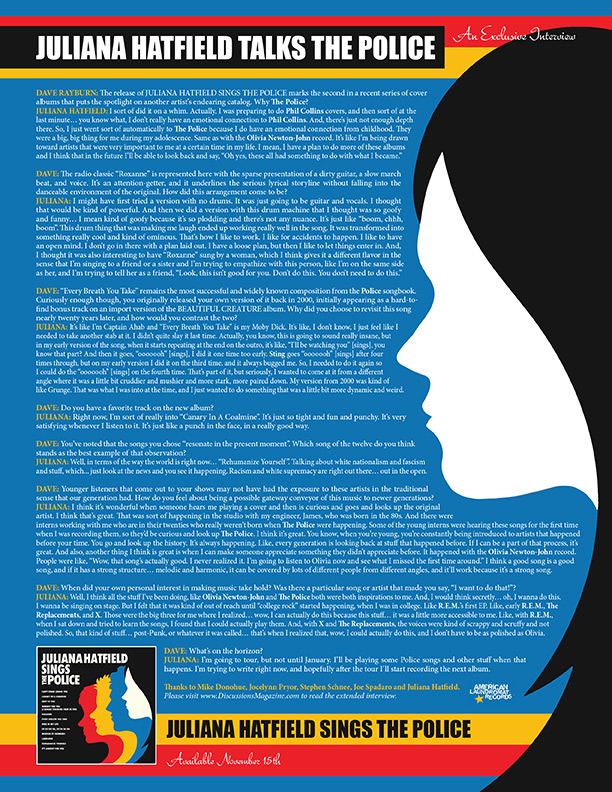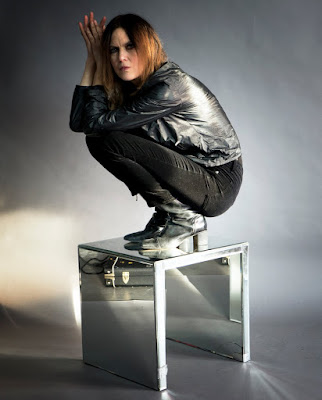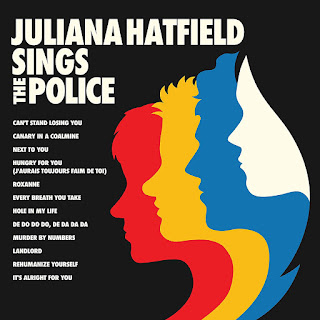DAVE RAYBURN: The release of JULIANA HATFIELD SINGS THE POLICE
marks the second in a recent series of cover albums that puts the spotlight on
another artist’s endearing catalog. Why The Police?
JULIANA HATFIELD: I sort of did it on a whim. Actually, I was preparing
to do Phil Collins covers, and then sort of at the last minute… you know what,
I don’t really have an emotional connection to Phil Collins. And, there’s just
not enough depth there. So, I just went sort of automatically to The Police
because I do have an emotional connection from childhood. They were a big, big
thing for me during my adolescence. Same as with the Olivia Newton-John record.
It’s like I’m being drawn toward artists that were very important to me at a
certain time in my life. I mean, I have a plan to do more of these albums and I
think that in the future I’ll be able to look back and say, “Oh yes, these all
had something to do with what I became.”
DAVE: The radio classic “Roxanne” is represented here with the
sparse presentation of a dirty guitar, a slow march beat, and voice. It’s an
attention-getter, and it underlines the serious lyrical storyline without
falling into the danceable environment of the original. How did this
arrangement come to be?
JULIANA: I might have first tried a version with no drums. It was
just going to be guitar and vocals. I thought that would be kind of powerful.
And then we did a version with this drum machine that I thought was so goofy
and funny… I mean kind of goofy because it’s so plodding and there’s not any
nuance. It’s just like “boom, chhh, boom”. This drum thing that was making me
laugh ended up working really well in the song. It was transformed into
something really cool and kind of ominous. That’s how I like to work. I like
for accidents to happen. I like to have an open mind. I don’t go in there with
a plan laid out. I have a loose plan, but then I like to let things enter in.
And, I thought it was also interesting to have “Roxanne” sung by a woman, which
I think gives it a different flavor in the sense that I’m singing to a friend
or a sister and I’m trying to empathize with this person, like I’m on the same
side as her, and I’m trying to tell her as a friend, “Look, this isn’t good for
you. Don’t do this. You don’t need to do this.”
DAVE: What kind of challenges did you face when tackling
“Hungry For You (J’aurais Toujours Faim De Toi)”, which is sung,
almost entirely, in French? Were you
already somewhat familiar or fluent with the language or did this present a
very specific obstacle in doing what you otherwise do quite naturally?
JULIANA: No, I’m a little bit familiar with French, and I studied a
lot of it in school. And, I even wrote and recorded a song in French for my
second album for Atlantic Records in 1995… a song called “Fleur De Lys”. So, I
had a little experience of my own singing in French, and also recorded another
song in French a long time ago. It was fun. It was like I understood a little
bit of what he was saying. I understood that Sting was doing a sort of
English-ified version of some of the pronunciation. Like, he wasn’t pronouncing
everything exactly correct. And, I think he was probably doing that
deliberately, ‘cause I don’t think anything he does is by accident. And, I
thought that was cool. You know, I tried to match him like when he was kind of,
maybe, slack on some of the pronunciation. I tried to match him. I didn’t want
to be with perfect French pronunciation because that would have not been the
spirit of the song.
DAVE: “Every Breath You Take” remains the most successful and
widely known composition from the Police songbook. Curiously enough though, you
originally released your own version of it back in 2000, initially appearing as
a hard-to-find bonus track on an import version of the BEAUTIFUL CREATURE
album. Why did you choose to revisit this song nearly twenty years later, and
how would you contrast the two?
JULIANA: It’s like I’m Captain Ahab and “Every Breath You Take” is
my Moby Dick. It’s like, I don’t know, I just feel like I needed to take
another stab at it. I didn’t quite slay it last time. Actually, you know, this
is going to sound really insane, but in my early version of the song, when it
starts repeating at the end on the outro, it’s like, “I’ll be watching you”
[sings], you know that part? And then it goes, “ooooooh” [sings], I did it one
time too early. Sting goes “ooooooh” [sings] after four times through, but on
my early version I did it on the third time, and it always bugged me. So, I
needed to do it again so I could do the “ooooooh” [sings] on the fourth time.
That’s part of it, but seriously, I wanted to come at it from a different angle
where it was a little bit cruddier and mushier and more stark, more paired
down. My version from 2000 was kind of like Grunge. That was what I was into at
the time, and I just wanted to do something that was a little bit more dynamic
and weird.
(Photo by Stacee Sledge)
DAVE: How much of this album is a true solo outing for you, and how
much outside involvement did you invite in?
JULIANA: It was really local. A couple of local guys did some of
the drums and bass. I don’t want to minimize their input by calling them “local
guys”. I mean, they both live around here in the Boston area. In fact, Ed
Valauskas, the guy who played some of the bass, I go way back with him. I
played with him a bunch. He’s played on a bunch of my recordings. He’s toured
with me. He’s the studio manager where I like to work. So, he’s a really good
friend and a really great guy, so he’s more than just a “local guy”. And, I wanted to do a lot of it myself… a lot
of the bass, because Sting’s bass playing is so fun to play along to. But, at
the same time, I wanted to record some of the basic tracks with a band. So, I
had Ed play some bass, and then his drummer, Chris Anzalone, so we could be a live
trio to start.
DAVE: Just as the Police were.
JULIANA: Yeah. But Chris was a new guy. I had never met him before.
Just a couple nights before the first scheduled session, I asked Ed if he knew
any drummers who could come and play some Police songs like tomorrow, and he
recommended this guy who was available, and he ended up being great. So, we
started off with this trio situation, and then I ended re-doing some drums and
playing some bass. I probably played half the bass, and Ed played half,
approximately. ‘Cause, I just wanted to do some of it myself because it’s so
fun playing those bass lines.
DAVE: Do you have a favorite track on the new album?
JULIANA: Right now, I’m sort of really into “Canary In A Coalmine”.
It’s just so tight and fun and punchy. It’s very satisfying whenever I listen
to it. It’s just like a punch in the face, in a really good way.
DAVE: You’ve noted that the songs you chose “resonate in the
present moment”. Which song of the twelve do you think stands as the best
example of that observation?
JULIANA: Well, in terms of the way the world is right now…
“Rehumanize Yourself”. Talking about white nationalism and fascism and stuff,
which… just look at the news and you see it happening. Racism and white supremacy
are right out there… out in the open.
DAVE: Younger listeners that come out to your shows may not have
had the exposure to these artists in the traditional sense that our generation
had. How do you feel about being a possible gateway conveyor of this music to
newer generations?
JULIANA: I think it’s wonderful when someone hears me playing a
cover and then is curious and goes and looks up the original artist. I think
that’s great. That was sort of happening in the studio with my engineer, James,
who was born in the 80s. And there were interns working with me who are in
their twenties who really weren’t born when The Police were happening. Some of
the young interns were hearing these songs for the first time when I was
recording them, so they’d be curious and look up The Police. I think it’s
great. You know, when you’re young, you’re constantly being introduced to
artists that happened before your time. You go and look up the history. It’s
always happening. Like, every generation is looking back at stuff that happened
before. If I can be a part of that process, it’s great. And also, another thing
I think is great is when I can make someone appreciate something they didn’t
appreciate before. It happened with the Olivia Newton-John record. People were like,
“Wow, that song’s actually good. I never realized it. I’m going to listen to
Olivia now and see what I missed the first time around.” I think a good song is
a good song, and if it has a strong structure… melodic and harmonic, it can be
covered by lots of different people from different angles, and it’ll work
because it’s a strong song.
DAVE: When did your own personal interest in making music take
hold? Was there a particular song or artist that made you say, “I want to do
that!”?
JULIANA: Well, I think all the stuff I’ve been doing, like Olivia
Newton-John and The Police both were inspirations to me. And, I would think
secretly… oh, I wanna do this. I wanna be singing on stage. But I felt that it
was kind of out of reach until “college rock” started happening, when I was in
college. Like R.E.M.’s first EP. Like, early R.E.M., The Replacements, and X.
Those were the big three for me where I realized… wow, I can actually do this
because this stuff… it was a little more accessible to me. Like, with R.E.M.,
when I sat down and tried to learn the songs, I found that I could actually
play them. And, with X and The Replacements, the voices were kind of scrappy
and scruffy and not polished. So, that kind of stuff… post-Punk, or whatever it
was called… that’s when I realized that, wow, I could actually do this, and I
don’t have to be as polished as Olivia.
DAVE: Your 2016 collaboration with Paul Westerberg (aka The I Don’t
Cares) raised a lot of eyebrows. Are there plans for a follow-up, or would you
entertain another duet style record with someone else rooted in melodic punk or
power pop… for example John Doe, Peter Case, or Matthew Sweet?
JULIANA: I don’t know if there’s going to be another I Don’t Cares
thing. I don’t know. But, I’m definitely up for doing something along those
lines.
DAVE: Well, you mentioned X… so I think John Doe would be a great
match, and you’ve worked with him before, right?
JULIANA: Yeah, I know John. Yeah, maybe… that could happen, maybe.
DAVE: Alright! I’ll cross my fingers now.
JULIANA: (laughs)
DAVE: During your time on American Laundromat Records, each of your
albums has seen release in multiple vinyl variations (different colors, etc.).
What’s your take on the vinyl revolution that has been enjoying a surprisingly
healthy surge in the digital age?
JULIANA: I think it’s great. It’s just another, different sonic
experience that people should know about. For me, I think digital files sound
like shit. Downloaded music sounds like shit to me. I don’t even really listen
to it. I don’t download or stream anything. I don’t like it. I don’t think it
sounds good, and I don’t understand it. I like that there are other options,
and I like the experience of listening to a whole album front to back rather
than having bits and pieces pop up at random. I mean, when I make an album, I’m
thinking of the whole thing, and I put a lot of time into the sequencing. So,
it’s cool when people can appreciate the flow of one song after the other. And,
it’s nice that, with albums, the artwork is more important because you can
actually see it and read it. I think it’s great that kids can have vinyl again.
DAVE: That was part of the process for me, you know? You put the
album on and sit there Indian-style and analyze every detail on that cover, and
that’s how you learn who plays on a record, who’s in the band, who the producer
is…
JULIANA: Yeah! I have so many memories of just album covers and
backs and inserts just burned into my mind. I can see them in my mind. And, I
feel sorry for people who are listening to music and there’s no visual. There’s just some file that pops up on their
playlist or whatever.
DAVE: Well, thankfully, it’s back… to a degree. And, I’m seeing the
younger generation definitely enjoying it.
JULIANA: I think it’s great. It’s too bad that vinyl is so
expensive these days… expensive to make. Maybe if more and more people demand
more and more, the prices will start to go down again. I don’t know.
DAVE: I think a lot of the pressing plants went away over the
years, so that kind of factors into the availability of being able to press
records.
JULIANA: Yeah, I know that when American Laundromat was setting up
the record, there was a really long lead-in for vinyl.
(Photo by David Doobinin)
DAVE: What’s on the horizon?
JULIANA: I’m going to tour, but not until January. I’ll be playing
some Police songs and other stuff when that happens. I’m trying to write right
now, and hopefully after the tour I’ll start recording the next album.
Thanks to Mike Donohue, Jocelynn Pryor,
Stephen Schnee, Joe Spadaro and Juliana Hatfield
JULIANA HATFIELD
JULIANA HATFIELD SINGS THE POLICE
11.15.19



